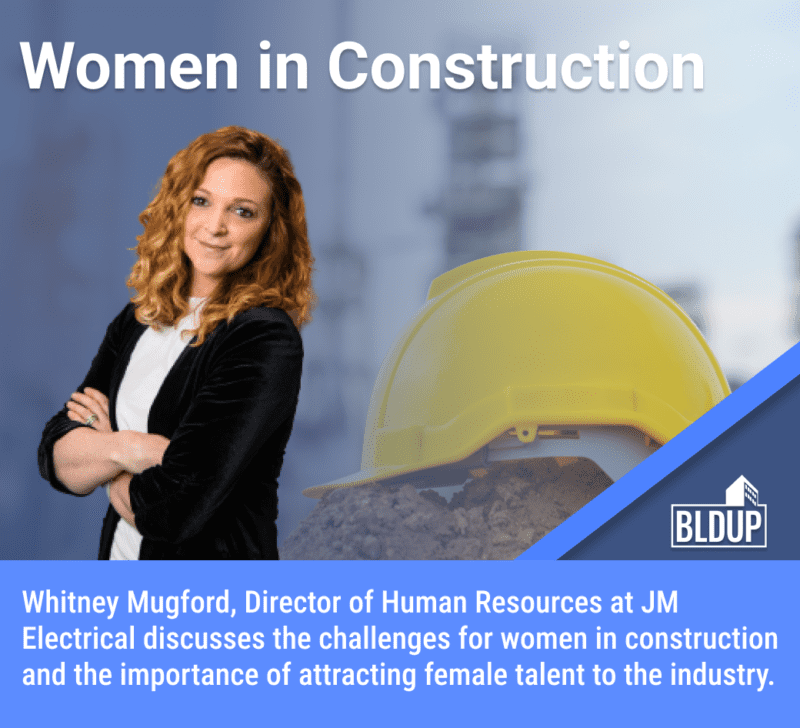BLDUP: What can and should construction companies do to attract more women to the field?
Whitney Mugford: Women continue to be greatly under-represented in construction, a traditionally male-dominated industry. Competitive benefits, including paid maternity leave, ample vacation time, flexible hours, properly fitting PPE, and financial support for childcare will help companies attract women and make it easier for them to be successful in this sector.
BLDUP: Are the issues women working in the construction industry care about different from the concerns expressed by men?
Whitney Mugford: Though childcare responsibilities shouldn’t only fall to women, the reality is they primarily do. Flexible work hours are important for making careers in the construction sector more accessible to women. How can you expect working mothers to be on-site at 6:00 a.m. when the doors at daycare centers don’t open until 7:00?
Mothers returning to work after maternity leave also need a higher level of on-the-job support. For example, when designing our new JME Innovation Center, we created a private space for nursing mothers returning to the workforce.
Another topic of conversation for women in construction; the need for Personal Protective Equipment (PPE) that actually fits. Companies should consider the women on their team when purchasing and supplying safety gear and recognize that one size does not fit all. Women without properly fitting PPE place themselves at an increased risk of injury while on the job. For example, hard hats are often too large for women and could slip forward, obstructing vision, fall off entirely, leaving women subject to head injuries. Currently, while several types of PPE are made just for women in the industry, there is room for major improvements.
BLDUP: What kind of support can companies like JME offer women who are new to the industry?
Whitney Mugford: The industry needs to advocate for equity. When women enter careers in construction, leadership must ensure they are treated with respect from the minute they set foot on a job site. Our foremen and journeymen are encouraged to invest time in women working in the field. This type of mentorship helps women rise through the ranks. Equally important, senior team members must create and promote a culture that does not tolerate sexism, discrimination, or bullying. No one should face discrimination based on age, gender, race, religion, or sexual orientation.
BLDUP: How can construction companies retain women and help them rise through the ranks?
Whitney Mugford: Flexibility, opportunity, and training are key. Further, introducing your female workforce to respected organizations such as the National Association of Women in Construction (NAWIC) and Women Construction Owners & Executives USA can promote empowerment, provide mentorship, and offers networking opportunities. We work closely with the National Electrical Contractors Association (NECA) and IBEW Local 103, which recently sponsored a Women Build Boston conference promoting equity in the construction industry. JME was fortunate to have a group of our strong female electricians participate in this event, one that raised awareness of the many successful women in the industry who continue to strive for respect, fair treatment, a career path, and a level playing field when it comes to wages.
BLDUP: Do construction companies offer mentorship, coaching and training programs to help women advance in their careers?
Whitney Mugford: Many construction companies fully recognize that a diverse workforce results in plenty of benefits, from creativity and problem solving, to a variety of abilities, experiences, and perspectives. While companies are eager to hire more women, recruitment can be challenging when there is often only a small pool of skilled female candidates to draw from.
No matter their gender, all of JME’s skilled electricians start out as apprentices and receive extensive training through the Joint Apprenticeship and Training Committee (JATC) Training Program. Over the course of the five-year Electrical Construction Program, apprentices undergo 10,000 hours of on-the-job training with experienced journeypersons, plus 1,000 hours of intensive classroom teaching by highly qualified instructors. Through this rigorous training, Electrical Construction apprentices leave the program with in-depth knowledge of the full scope of their field.
BLDUP: Are women visible throughout the industry or are there certain positions that seem to attract more women?
Whitney Mugford: When you think of “women in construction,” you might just think of someone swinging a hammer on a job site or pulling wire in the field. In reality, women today either lead or are intricately involved in all functional areas of construction, including business development, project management, estimating, finance, field operations, human resources, and marketing.
BLDUP: Why is having women in construction good for the industry?
Whitney Mugford: There’s no doubt (and research can attest) that men and women think differently. While men tend to excel in motor skills, women have a natural advantage when it comes to communication, relationship-building skills, and analytical thinking. Women bring creativity and new ideas to projects.
Women are paving the way for the next generation and their voices are stronger than ever. Fortunately, companies like JME are increasing their efforts to recruit, promote and educate women in construction. Although still underrepresented, women are making great strides as leaders in the trade. Despite the challenges some still face in the industry, I would strongly encourage women that are interested in this dynamic field to consider a career in construction.
For more information visit the following sites: Women in NECA at https://www.necanet.org/about-neca/member-groups/winfl, Professional Women in Construction at https://boston.pwcusa.org/, or the National Association of Women in Construction at https://www.nawicboston.org
By: Whitney Mugford, Director of Human Resources
